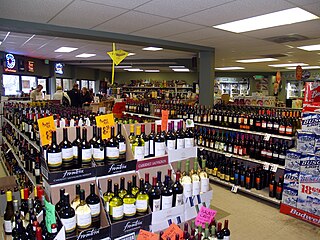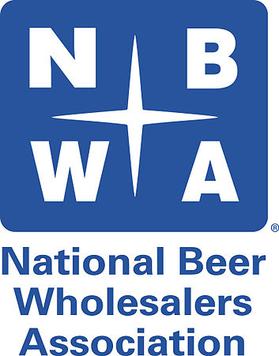
Homebrewing is the brewing of beer or other alcoholic beverages on a small scale for personal, non-commercial purposes. Supplies, such as kits and fermentation tanks, can be purchased locally at specialty stores or online. Beer was brewed domestically for thousands of years before its commercial production although its legality has varied according to local regulation. Homebrewing is closely related to the hobby of home distillation, the production of alcoholic spirits for personal consumption, but home distillation is generally more tightly regulated.

Buckfast Tonic Wine is a caffeinated alcoholic drink consisting of fortified wine with added caffeine, originally made by monks at Buckfast Abbey in Devon, England. It is now made under a licence granted by the monastery, and distributed by J. Chandler & Company in Great Britain, James E McCabe Ltd in Northern Ireland, and Richmond Marketing Ltd in Ireland. It is based on a traditional recipe from France. The wine's distributor reported record sales of £43.2 million as of March 2017.

Traditional ginger beer is a sweetened and carbonated, usually non-alcoholic beverage. Historically it was produced by the natural fermentation of prepared ginger spice, yeast and sugar.

In the United Kingdom, a tied house is a public house required to buy at least some of its beer from a particular brewery or pub company. That is in contrast to a free house, which is able to choose the beers it stocks freely.

In the United States, beer is manufactured in breweries which range in size from industry giants to brew pubs and microbreweries. The United States produced 196 million barrels (23.0 GL) of beer in 2012, and consumes roughly 28 US gallons (110 L) of beer per capita annually. In 2011, the United States was ranked fifteenth in the world in per capita consumption, while total consumption was second only to China.
The three-tier system of alcohol distribution is the system for distributing alcoholic beverages set up in the United States after the repeal of Prohibition. The three tiers are importers or producers; distributors; and retailers. The basic structure of the system is that producers can sell their products only to wholesale distributors who then sell to retailers, and only retailers may sell to consumers. Producers include brewers, wine makers, distillers and importers. The three-tier system is intended to prohibit tied houses and prevent "disorderly marketing conditions."

A liquor store is a retail business that predominantly sells prepackaged alcoholic beverages, including liquors, wine or beer, usually intended to be consumed off the store's premises. Depending on region and local idiom, they may also be called an off-licence, off-sale, bottle shop, bottle store or, colloquially, bottle-o, liquor store or other similar terms. A very limited number of jurisdictions have an alcohol monopoly. In US states that are alcoholic beverage control (ABC) states, the term ABC store may be used.

Alcohol Justice is a San Rafael, California-based non-profit advocacy, research and policy organization describing itself as "the industry watchdog." The Marin Institute was renamed and re-branded as Alcohol Justice in 2011; it was originally named The Marin Institute for the Prevention of Alcohol and Other Drug Problems.

Alcoholic beverage control states, generally called control states, less often ABC states, are 17 states in the United States that have state monopoly over the wholesaling or retailing of some or all categories of alcoholic beverages, such as beer, wine, and distilled spirits.
The Washington State Liquor and Cannabis Board, formerly the Washington State Liquor Control Board, is an administrative agency of the State of Washington. The Liquor and Cannabis Board is part of the executive branch and reports to the Governor. The board's primary function is the licensing of on and off premises establishments which sell any type of alcohol, and the enforcement and education of the state's alcohol, tobacco, and cannabis laws.

A liquor license is a governmentally issued permit for businesses to sell, manufacture, store, or otherwise use alcoholic beverages.

Oklahoma allows any establishment with a beer and wine license to sell beer and wine up to 15% ABV, under refrigeration.

William Rockwell "Rocky" Wirtz was an American businessman. He was the principal owner and chairman of the Chicago Blackhawks of the National Hockey League. He was also president of the Blackhawks' parent company, the Wirtz Corporation, a diversified conglomerate headquartered in Chicago. Under Wirtz's leadership, the Chicago Blackhawks won three Stanley Cups between 2010 and 2015, reversing a period of declining fan interest and on-ice performance. He oversaw Wirtz Corporation's commercial and residential real estate companies, wine and spirits distributor Breakthru Beverage Group, an insurance company, and banks in Illinois and Florida. Wirtz was also half-owner of the Blackhawks' home arena, the United Center, along with Chicago Bulls owner Jerry Reinsdorf. He and Reinsdorf were co-chairmen of the arena's Executive Committee.

The National Beer Wholesalers Association (NBWA) is a trade association that represents the interests of nearly 5,000 beer distributors throughout the United States before government and the public. In 2022, their political action committee was the third largest, ranked by total amount raised.
Hensley Beverage Company, previously known as Hensley & Co., is a wholesaler and distributor for Anheuser-Busch beer, and later for a variety of other brands and drinks, that is headquartered in the West Phoenix area of Phoenix, Arizona. As of 2007, it was the third-largest Anheuser-Busch distributor in the United States and one of the largest privately held companies in Arizona.

The alcohol laws of Pennsylvania contain many peculiarities not found in other states, and are considered some of the strictest regulations in the United States.

An alcoholic beverage is a beverage containing alcohol (ethanol). Alcoholic drinks are typically divided into three classes—beers, wines, and spirits—and typically their alcohol content is between 3% and 50%.
Blue laws, also known as Sunday laws, are laws that restrict or ban some or all activities on specified days, particularly to promote the observance of a day of rest. Such laws may restrict shopping or ban sale of certain items on specific days. Blue laws are enforced in parts of the United States and Canada as well as some European countries, particularly in Austria, Germany, Switzerland, and Norway, keeping most stores closed on Sundays.
A malt drink is a fermented drink in which the primary ingredient is the grain or seed of the barley plant, which has been allowed to sprout slightly in a traditional way called "malting" before it is processed.














